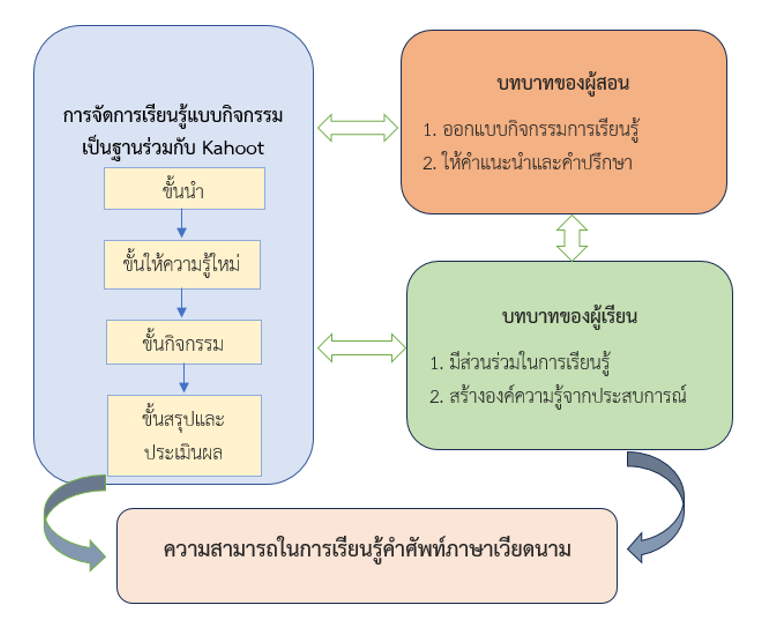ACTIVITY BASED LEARNING WITH KAHOOT FOR DEVELOPING VIETNAMESE VOCABULARY LEARNING ABILITY OF STUDENTS AT MAHASARAKHAM UNIVERSITY
Main Article Content
Abstract
The purposes of this research were: 1) to determine the efficiency of Activity based learning with Kahoot for developing Vietnamese vocabulary learning ability of students at Mahasarakham University with 80/80 criteria of effectiveness, 2) to compare the ability to learn Vietnamese vocabulary before and after learning management, 3) to study the retention of Vietnamese vocabulary after using the learning management with Kahoot. The sample of this research was 39 students who registered the subject 004 1017 Vietnamese for Communication, Mahasarakham University, semester 1/2023 which was obtained by Simple Random Sampling by using the classroom drawing method random unit. The experimental research instruments consisted of lesson plans and the Vietnamese vocabulary test. Statistics for data analysis include mean, standard deviation, and dependent samples t-test.
The results of the research appeared as follows: 1) Activity based learning with Kahoot for developing Vietnamese vocabulary learning ability of students at Mahasarakham University was 80.82/79.36 which exceeded the threshold of 80/80. 2) Vietnamese vocabulary learning ability of students at Mahasarakham University after using of Activity based learning with Kahoot were significantly higher than before used at .0 5 level. 3) The students’ retention English vocabulary after 2 weeks was 30.90 out of 40, not below 70% and the result was not significantly different from posttest at .0 5 level.
Article Details

This work is licensed under a Creative Commons Attribution-NonCommercial-NoDerivatives 4.0 International License.
References
ฉันฐรัช หงส์บุญไตร และคณะ. (2564). ความเงียบในชั้นเรียนวิชาภาษาอังกฤษเป็นภาษาต่างประเทศ: บทบาทความสัมพันธ์ของผู้สอน ผู้เรียน เนื้อหารายวิชา และบรรยากาศในชั้นเรียนตามทฤษฎีของ Schwab. วารสารเทคโนโลยีสุรนารี. 15(1). 128-146.
ชนสิทธิ์ สิทธิ์สูงเนิน และคณะ. (2565). การจัดการเรียนรู้ด้วยกิจกรรมเป็นฐานร่วมกับเทคโนโลยีเพื่อส่งเสริมความเป็นนวัตกรและผลงานสร้างสรรค์สำหรับนักเรียน Activity-Based. มนุษยสังคมสาร (มสส.). 20(2). 89-110.
ณัฐนนท์ ภู่ตระกูล และคณะ. (2564). การพัฒนาการจดจำคำศัพท์ภาษาอังกฤษผ่านเกมประกอบการสอน ในนักเรียนชั้นมัธยมศึกษาปีที่ 3 โรงเรียนวัดไร่ขิงวิทยา. วารสารวิชาการมหาวิทยาลัยราชภัฏเพชรบุรี. 11(3). 91-97.
ปิยะนุช แจ่มหม้อ. (2563). การพัฒนากิจกรรมการเรียนรู้โดยใช้กิจกรรมเป็นฐานเสริมทักษะภาษาอังกฤษเพื่อการสื่อสาร สำหรับนักเรียนชั้นมัธยมศึกษาปีที่ 1. วิทยานิพนธ์ปริญญาการศึกษามหาบัณฑิต สาขาวิชาวิจัยและประเมินผลทางการศึกษา. บัณฑิตวิทยาลัย : มหาวิทยาลัยนเรศวร.
พรเพ็ญ ไตรพงษ์. (2562). ผลสัมฤทธิ์การเรียนรู้คำศัพท์ภาษาอังกฤษเกี่ยวกับกฎหมายอาญา และวิธีพิจารณาความอาญาจากการเล่นเกม Kahoot ของนักศึกษาหลักสูตรนิติศาสตร์. วารสารวิจัยราชภัฏพระนคร สาขามนุษยศาสตร์และสังคมศาสตร์. 14(2). 258-274.
เพ็ญนภา ตลับกลาง และภัทร์ธีรา เทียนเพิ่มพูน. (2562). การพัฒนาผลสัมฤทธิ์การเรียนรู้คำศัพท์ภาษาอังกฤษโดยใช้วิธีสอนกิจกรรมเป็นฐาน สำหรับนักเรียนชั้นประถมศึกษาปีที่ 2 โรงเรียนวัดเขียนเขต จังหวัดปทุมธานี. วารสารรัชต์ภาคย์. 13(3). 195-208.
ภีมพัฒน์ วรโชติธีรวัชร์. (2561). การศึกษาการมีส่วนร่วมในกิจกรรมภาษาต่างประเทศโดยใช้กิจกรรมเป็นฐาน สำหรับนักศึกษามหาวิทยาลัยศรีปทุม. สารนิพนธ์หลักสูตรศึกษาศาสตรมหาบัณฑิต สาขาวิชานวัตกรรมการเรียนรู้และการสอน. คณะสหวิทยาการ เทคโนโลยีและนวัตกรรม : มหาวิทยาลัยศรีปทุม.
เมธิรา ผาตินุวัติ. (2562). ทักษะแห่งศตวรรษที่ 21 และแนวทางการบูรณาการทักษะแห่งศตวรรษที่ 21 ในวิชาภาษาอังกฤษสำหรับการบิน. วารสารมนุษยศาสตร์และสังคมศาสตร์นายเรืออากาศ. 7(1). 2562.
สิริวงษ์ หงษ์สวรรค์ และสมหมาย ชินนาค. (2558). การเรียนการสอนและผู้เชี่ยวชาญภาษาเวียดนามในประเทศไทย. กรุงเทพมหานคร : สำนักงานคณะกรรมการการอุดมศึกษา.
เหงวียน ธู ฮว่าย และธนดล ภูสีฤทธิ์. (2566). การพัฒนาการจัดการเรียนรู้เชิงรุกร่วมกับช3องทางการเรียนรู้ออนไลน์ที่ส่งเสริมความสามารถการอ่านภาษาเวียดนามเพื่อความเข้าใจของนิสิตมหาวิทยาลัยมหาสารคาม. วารสารศึกษาศาสตร์ มหาวิทยาลัยมหาสารคาม. 17(3). 1-16.
Allen, V. F. (1983). Techniques in teaching vocabulary. New York : Oxford University Press.
Anwer, F. (2019). Activity-Based Teaching, Student Motivation and Academic Achievement. Journal of Education and Educational Development. 6(1). 154-170.
Buehl, D. (2001). Classroom strategies for interactive learning. Newark, DE : International Reading Association.
Huyen, N.T. (2022). The Effects of Using Online Applications to Teach Vocabulary to English Learners of HUFI in Ho Chi Minh City. International Journal of TESOL & Education. 2(3). 32-42.
Sari, Enden R. (2018). Kahoot Application as Technology Resources in Teaching Reading Comprehension. Journal of English Language Learning. 2(1). 1-6.
Susie, K., Mia, R. Students' Engagement in Learning English Vocabulary Via Games in Kahoot!. English Journal Literacy Utama. 6(1). 444-452.


